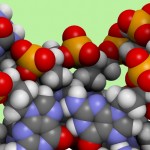 Losing weight through bariatric surgery may have an effect in rewinding genetic signs of aging, according to a new study. Researchers from Stanford University found that in some gastric bypass patients, chromosome caps known as telomeres–which usually get shorter as people age–actually grew longer. While the telomeres only grew by about 2 to 3 percent in length, any growth will likely reverse the effects of aging, according to Dr. John Morton, President-Elect of the American Society for Metabolic and Bariatric Surgery (ASMBS). Patients who were the sickest before surgery saw the greatest benefit — those who were not only heavy, but also had problems like heart disease and chronic inflammation.
Losing weight through bariatric surgery may have an effect in rewinding genetic signs of aging, according to a new study. Researchers from Stanford University found that in some gastric bypass patients, chromosome caps known as telomeres–which usually get shorter as people age–actually grew longer. While the telomeres only grew by about 2 to 3 percent in length, any growth will likely reverse the effects of aging, according to Dr. John Morton, President-Elect of the American Society for Metabolic and Bariatric Surgery (ASMBS). Patients who were the sickest before surgery saw the greatest benefit — those who were not only heavy, but also had problems like heart disease and chronic inflammation.
The patients in the study were mostly women with an average age of 49 and an average body mass index of 44. They lost, on average, 71 percent of their excess weight after undergoing gastric bypass surgery. Their fasting insulin levels (an indicator of dangerous metabolic syndrome) dropped four-fold and their levels of C-reactive protein (a measure of inflammation) declined more than 60 percent. The study also found that in patients with high levels of LDL or “bad” cholesterol and inflammation before the operation, their telomeres lengthened, compared to patients with lower LDL levels.
While the findings sound encouraging, they don’t indicate that bariatric surgery is a “magic bullet” which will reverse aging. Further research is needed to confirm the effects of surgery on telomere lengths, as well as the effects of telomere length on actual health.
Related Reading: Health and Social Improvements After Bariatric Surgery






Weight Loss Studies & Clinical